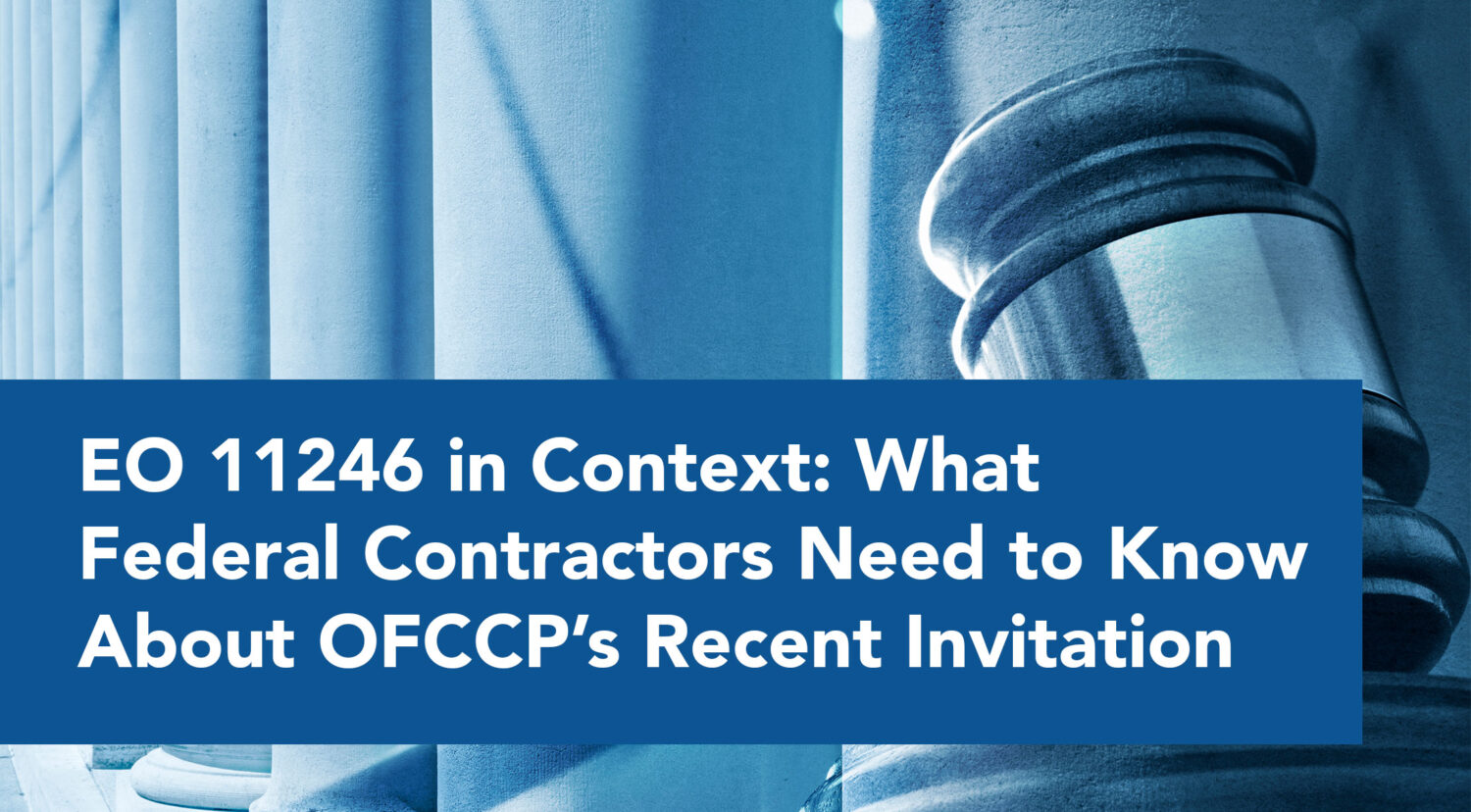

The newly appointed Director of the Office of Federal Contract Compliance Programs (OFCCP) has sent an email, June 27, 2025, inviting federal contractors to voluntarily report how they have wound down their compliance with Executive Order (EO) 11246. The letter asserts that EO 11246 encouraged discriminatory practices such as race- or sex-based quotas and implies that the regulation was misused by contractors nationwide.
We believe this characterization is inaccurate and risks undermining decades of lawful, effective compliance efforts by federal contractors who faithfully upheld nondiscrimination principles.
What EO 11246 Actually Mandated
EO 11246, established in 1965, required federal contractors to proactively prevent discrimination and take affirmative steps to ensure equal employment opportunity. It explicitly prohibited discrimination based on race, color, religion, sex, and national origin. Over the years, this mandate was clarified through regulations stating that affirmative action should never result in quotas, preferences, or reverse discrimination.
OFCCP’s own regulations confirmed this:
“Placement goals do not require that any specific number or percentage of persons be hired, and must not be used to discriminate against any applicant or employee because of race, color, religion, sex, or national origin.” (41 CFR §60-2.16(e)”
Affirmative action under EO 11246 was never about workforce balancing for its own sake. It was about identifying disparities and developing outreach, recruitment, and development strategies to expand equal opportunity.
Misplaced Criticism and Unfounded Assumptions
Director Catherine Eschbach’s letter suggests that many federal contractors engaged in improper race- and sex-based employment practices, allegedly encouraged by EO 11246. However, this assertion lacks credible evidence of widespread abuse that would justify such a sweeping rejection of a long-standing civil rights framework.
In fact, EO 11246 has been actively and lawfully enforced. A prime example is the OFCCP’s November 4, 2024 announcement of a settlement with McKesson Corporation. Following a compliance review covering the period from 2019 to 2021, the agency cited McKesson for systemic racial hiring discrimination against 884 Black, Hispanic, and White applicants for associate material handler positions. The company agreed to pay $448,000 in back wages to affected individuals. This case, along with many others, clearly illustrates that EO 11246 was faithfully enforced as intended: to detect and correct workplace discrimination affecting all American workers, regardless of race or sex, without promoting favoritism or bias.
Yes, there were isolated misinterpretations. But when they occurred, the proper response was targeted enforcement or compliance assistance, not dismantling a regulatory structure that functioned lawfully and effectively for decades.
The Risk of Regulatory Confusion
This new communication (invitation) presents a troubling message to federal contractors: if you conducted training programs, diversity outreach, or leadership development initiatives focused on underrepresented groups, you may have been out of compliance.
That interpretation chills legitimate inclusion efforts and introduces uncertainty. Contractors are now left wondering:
- What constitutes a lawful diversity program?
- Are race- and gender-conscious outreach efforts now presumed unlawful?
- Does voluntary disclosure now invite scrutiny?
Such ambiguity hinders progress toward equitable workplaces and puts well-meaning employers in a precarious position.
Affirmative Action vs. Discrimination: Know the Difference
Let’s be clear: Affirmative action is not the same as discrimination. EO 11246 compliance was never intended to disadvantage anyone. It aimed to ensure all individuals, regardless of their race or sex, have access to opportunity. Abuses of that system should be addressed on a case-by-case basis, not assumed across the board.
Moving Forward: Clarity, Not Confusion
If the goal of EO 14173 is to restore merit-based opportunity, it should do so without falsely equating affirmative action with discrimination. The OFCCP should issue clear, practical guidance to federal contractors outlining:
- What lawful DEI and outreach efforts look like under EO 14173
- How to maintain nondiscriminatory practices while still promoting inclusive workplaces
- What documentation and disclosures, if any, are actually required
- How to monitor and detect illegal discrimination
Federal contractors remain committed to fairness, opportunity, and compliance. But they need partnership and clarity, not suspicion and rewriting of history.
The enforcement of Executive Order 14173 is transforming compliance requirements for federal contractors. Join us on August 6, 2025, at 10:30 AM PST for an exclusive virtual roundtable led by government officials for clear, actionable guidance to navigate the evolving regulatory landscape confidently. Learn more about this webinar
If you’re unsure whether your DEI programs comply with Title VII and EO 14173, our team can help. Contact us for a Compliance Risk Review or a DEI Policy Audit tailored to your federal obligations.



